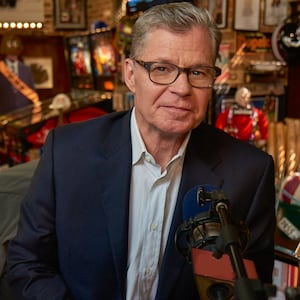On the night of Sept. 6, 2007, Novak Djokovic became a star. It wasn’t so much his straight-sets victory over a dazed Carlos Moya in the U.S. Open quarterfinal that did it but what came after, as the wiry 20-year-old assumed the role of center-court jester—first sprinting to the baseline and then, over the next several minutes, regaling the crowd with spot-on impressions of Maria Sharapova and Rafael Nadal. The cheers were deafening.
“That was all Novak. He is incredible,” offered the USA Network’s sideline reporter Michael Barkann, who’d teed up the impressions. “I’ll live off this for a couple of years.”
I was there that evening, and have had a major soft spot for the eccentric Serb ever since. His early trainer-hailing and taunting of Andy Roddick—who probably had it coming—felt like small potatoes when compared to his UNICEF ambassadorships and infectious diablerie. But Djokovic’s actions over the past five months have been so egregious they’ve forced me to reconsider.
The tennis great’s recent screw-up—accidentally firing a tennis ball into the throat of a lineswoman at the U.S. Open, causing him to default and her to receive death threats—is just the tip of the idiot iceberg, really. (He’s since apologized.) Eyebrows were first raised in April, when Djokovic, who’s long dabbled in questionable new age-healing practices (he infamously hired a spiritual guru, Pepe Imaz, to “train” and accompany him for a year and a half, during which he won zero Grand Slams), hosted a discussion on his Instagram Live with Chervin Jafarieh, an ex-real estate broker turned snake-oil salesman. Jafarieh runs Cymbiotika, a Goop-like company hawking high-priced, non-FDA approved vegan elixirs for hundreds of dollars that supposedly possess healing powers.
During their chat, Jafarieh forwarded the baseless theory that people’s immune systems are becoming damaged during the COVID-19 crisis due to a mental “state of fear,” while Djokovic maintained that people could purify polluted water with their minds, saying, “I know some people that, through energetical [sic] transformation, through the power of prayer, through the power of gratitude, they managed to turn the most toxic food, or maybe the most polluted water, into the most healing water, because water reacts.”

Novak Djokovic tends to a lineswoman after inadvertently striking her with a ball hit in frustration during his fourth round match against Pablo Carreno Busta at the 2020 US Open on September 6, 2020 in New York City.
Al Bello/gettyThe Jafarieh talks came on the heels of Djokovic, who is a proponent of natural healing, voicing that he was “opposed” to taking a coronavirus vaccine due to his own, rather vague “thoughts on the matter” (he later declined to address whether he opposed all vaccines). But all this served as a mere prelude to the Adria Tour—a series of exhibition tennis matches thrown by Djokovic in June. As COVID-19 ravaged the world, killing thousands of people a day, Djokovic’s leg of the tour in Serbia saw the tennis great play to a packed crowd with little mask-wearing and no social distancing; on top of that, players hugged and shook hands at matches, showing little regard for the pandemic.
Djokovic defended his decision to host the event by arguing that Serbia had “better numbers” of infections than the rest of the world, adding, “Of course, lives have been lost and that’s horrible to see, in the region and worldwide. But life goes on, and we as athletes are looking forward to competing.”
The Adria Tour was canceled after a number of players—including Grigor Dimitrov, Borna Coric, and Viktor Triocki—along with Djokovic, his wife Jelena, and his coach Goran Ivanisevic contracted COVID-19. Since the tour was held in Serbia, Croatia, Montenegro, and Bosnia and Herzegovina, there’s no telling how many people were infected in total. To add insult to injury, a number of videos soon emerged of Djokovic and the other players on the tour dancing shirtless in nightclubs.
When Djokovic was asked about the tour debacle by The New York Times a few weeks ago, he seemed defensive and unapologetic.
“I don’t think I’ve done anything bad to be honest,” he said. “I do feel sorry for people that were infected. Do I feel guilty for anybody that was infected from that point onward in Serbia, Croatia and the region? Of course not. It’s like a witch hunt, to be honest. How can you blame one individual for everything?”
One week later, on Aug. 28, it was reported that Djokovic—along with Vasek Pospisil—had co-founded the Professional Tennis Players Association, a sort of men’s rights organization for tennis players, with members asserting that “women’s players did not deserve to make as much money as the men.”
Djokovic is a 17-time Grand Slam champion, the current world No. 1, and will go down as one of the greatest tennis players of all time. But his legacy has been unquestionably damaged these past months. Perhaps tennis bad boy Nick Kyrgios said it best: “Hell of a tennis player. May go unbeaten in 2020, can’t take that away from him. Unfortunately when he was supposed to show some leadership and humility he went missing.”


